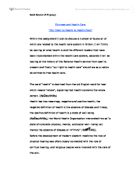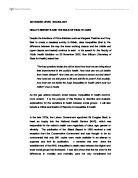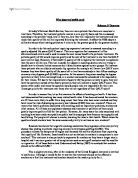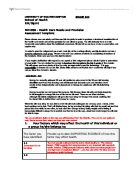-
Physical Health-concerns the body e.g. being fit and not being ill.
-
Mental Health- refers to a positive sense of purpose and an underlying belief in ones own self worth e.g. feeling good, and feeling able to cope.
-
Emotional Health-Concerns the ability to express feeling and to develop and sustain relationships e.g. feeling loved.
-
Social Health-concerns the sense of having support available from family and friends e.g. having friends to talk to, and being involved in activities with others.
-
Spiritual Health-is the recognition and ability to put into practice moral, religious principles or beliefs.
-
Sexual Health-is the acceptance and the ability to achieve a satisfactory expression of one’s own sexuality.
-
Societal Health-this include shelter, peace, food, and income which are needed to sustain a healthy well being.
-
Environmental-refers to the physical environment in which people live e.g. housing, transport, sanitation and pure/clean water facilities. (Naidoo/Willis)
With the use of the bio-psychosocial model in health care the days have now long gone when the understanding of biology was all that was needed to understand and treat
Illness. (Lecture notes)
In the nineteenth century sickness was a primary cause of pauperism, due to this the poor law began to create and develop infirmaries for the sick and destitute however the infirmaries were regarded as dangerous places to be, that was until the very end of the nineteenth century when developments in anaesthesia, medicine, and antiseptic improved the success rates of treatment. (Lecture notes)
Medical care in the nineteenth century was principally private or voluntary it was mainly used by the poor, health services were mainly based on the following sources:
-
Charity and Voluntary Sector-which relied heavily on local subscriptions, after the First World War voluntary hospitals found themselves with mounting financial difficulties and by 1037 a third were bankrupt. (Giddens)
-
Private Health Care-theses were fee-paying hospitals/infirmaries or were paid by means of private insurance scheme.
-
The Poor Law (municipal hospitals)-provided public assistance to the very poorest and unemployed (rgu.com). However in 1929 the poor law infirmaries were taken over by local authorities. (Lecture notes)
At the end of the Second World War, workers had raised expectations of a better future; thousands had died within the war and those returning felt that they deserved decent jobs and better living standards after the sacrifices that they had made. The organised working class had long fought for better health provision and social security; most people hated the 350-year-old “Poor Law”. (Socialistparty.org.uk)
In 1942 a man by the name of William Beveridge was appointed by the wartime coalition government to review the range of insurance schemes that had been in post since the turn of the century. The report he produced in December 1942 namely the Beveridge report was a plan for a comprehensive reform of social policies in which health care would be universally available and funded by taxation. (Naidoo/Willis) Beveridge’s report formed the basis of the Labour governments welfare state, one of the key policies that was highlighted in the plan was to tackle and combat the five giants in society these were want, disease, ignorance, squalor, and idleness.
Largely based on Beveridge’s report, the National Health Service came into creation in 1948 it promised to provide health care for everyone based on need and not the ability to pay. The NHS brought hospital services, family practitioners services (doctor, opticians, and dentists) and community-based services into one organisation for the first time. (nhs.co.uk)
Within three years of its creation, the NHS, which had been conceived as a free service for all and free of direct charges, was forced to introduce fees for prescriptions and dental treatment in 1952. (Lecture notes)
The gatekeeper to the NHS was the GP (general practitioner) whom referred patients to hospitals for specialist treatment and also for prescribing patient drugs which were very expensive.
By the second decade the treatment the NHS was offering was of a higher standard as treatment was improving as a result of new and better drugs were introduced however the drugs were costing the NHS a great deal.
In 1962 a man by the name of Enoch Powell produced a hospital plan, which was approved and developed, it approved the development of district general hospitals being built for areas with a population that exceeded 125,000, the ten year plan put forward a new territory for the NHS. (nhs.co.uk) As a result of the hospital plan, more hospitals were providing more people with better and more local services.
In 1974 there was a shake up within the NHS, which enabled health authorities to plan all their services and cooperate with local authorities for the first time.
Restructuring was implemented in 1982 to simplify the organisation there were now 14 regional health authorities, 192 district authorities, 7 special health authorities, and 90 family practitioner committees. (Nhs.history.co.uk)
The NHS experienced it’s most significant cultural shift with the introduction of the internal market, the internal market was implemented by the labour government in 1989-1990 to tackle the growing waiting lists which had arisen from the 1980’s (Giddens). I enabled the health authorities and family practitioners to purchase health care from providers (acute hospitals).
A new white paper issued by the department of health stated that the new NHS would be modern and dependable, the paper set out an approach which promised to “go with the grain” it described the approach as “a new model for a new century” based on delivering a high quality service, the aims as se out in the NHS plan are as follows:
- The nhs will provide a comprehensive range of services
- The nhs will shape it’s service around the needs and preferences of the individual patients, their families and carers
- The nhs will respond to different needs of the different populations
- The nhs will work continuously to improve the quality of service that they deliver
- Public funds for health care will be devoted solely to the NHS patient.
- The NHS will help keep people healthy and work to reduce health inequalities.
- The nhs will respect the confidentiality of individual patients and provide open access to information about services, treatment and performance
- The nhs will work together with others to ensure a seamless service for all patients
(nhs/plan.co.uk)
The welfare states crowning glory was the National Health Service, since 1948 the creation has benefited everyone from the rich to the poor.
However inequalities still remain in health care today a postcode lottery exists, where those who are less well off tend to have a greater need and yet have less access to health than the rich whom needing treatment can pay to be treated privately.
Over the past 50 years there have been a number of policies and changes within the NHS, however the cost of health care is still spiralling out of control due to increasing expectations made by the public. In part the NHS is failing to deliver due the years that it has been under funded. Today in effect we have come full circle since 1938, but we do face slightly different challenges, an ageing population, a high level of literacy, different expectations and behaviours together with specific problems such as HIV/AIDS, BSE, New Variant CJD, and Drug abuse exploding in a climate of high unemployment.
In 1948 when the NHS was implemented by he labour government It promised that health care would be free to the point of use based on the need and not the ability to pay, it also promised equality for all. Now due to increased expectations, abuse, cost and debt were asked to consider other means of paying for health care such as paying by means of private health insurance. In my this would be similar to life before the creation of the nhs, it would simply be turning the clock back 60 years with issues such as pauperism arising, the gap between rich and poor is on the increase surely by implementing a scheme cud as this would widen the gap further, Beveridge’s vision would be lost, the issues Beveridge wanted to combat would simply go on the increase.
The health service would be of more benefit staying as a free service to members of the public, however the health service is open to abuse and is being abused. In order to reduce the cost facing the nhs their needs to be clear sets of objectives in place in relation to what is defined as a clinical need and what is not defined as a clinical need is for example a breast enlargement performed on the nhs for vanity, is that a clinical need?
There also needs to be greater emphasis placed on members of the public to take responsibility of their own health as to reduce the impending costs faced by the NHS.
Reference List
Books.
-
Kirby/Kidd/Barter (1997) Sociology in perspective, Oxford, Heinemann plc.
-
Giddens, A (2001) Sociology 4th.ed. Cambridge: Blackwell plc.
-
Naidoo/Willis (2001) Health Studies, New York: Pall grave ltd
-
Naidoo/Willis (2001) Health Promotion 2nd.ed. London: Bailiere Tindall/RCN.








